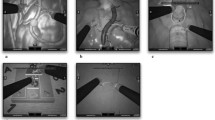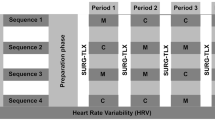Abstract
Background
Studies on a virtual reality simulator have demonstrated that sleep-deprived residents make more errors. Work-hour restrictions were implemented, among other reasons, to ensure enough sleep time for residents. The objective of this study was to assess the effects of sleep time, perceived fatigue, and experience on surgical performance. We hypothesized that performance would decrease with less sleep and fatigue, and that experienced surgeons would perform better than less experienced surgeons despite sleep deprivation and fatigue.
Methods
Twenty-two surgical residents and attendings performed a peg transfer task on two simulators: the Fundamentals of Laparoscopic Skills (FLS) trainer and the Virtual Basic Laparoscopic Surgical Trainer (VBLaST©), a virtual version of the FLS. Participants also completed questionnaires to assess their fatigue level and recent sleep hours. Each subject performed ten trials on each simulator in a counterbalanced order. Performance was measured using the FLS normalized scores and analyzed using a multiple regression model.
Results
The multiple regression analysis showed that sleep hours and perceived fatigue were not covariates. No correlation was found between experience level and sleep hours or fatigue. Sleep hours and fatigue did not appear to affect performance. Expertise level was the only significant determinant of performance in both FLS and VBLaST©.
Conclusions
Restricting resident work hours was expected to result in less fatigue and better clinical performance. In our study, peg transfer task performance was not affected by sleep hours. Experience level was a significant indicator of performance. Further examination of the complex relationship between sleep hour, fatigue, and clinical performance is needed to support the practice of work-hour restriction for surgical residents.


Similar content being viewed by others
References
Eastridge BJ, Hamilton EC, O’Keefe GE, Rege RV, Valentine RJ, Jones D, Tesfay S, Thal ER (2003) Effect of sleep deprivation on the performance of simulated laparoscopic surgical skill. Am J Surg 186:169–174
BaHammam AS, Alaseem AM, Alzakri AA, Almeneessier AS, Sharif MM (2012) The relationship between sleep and wake habits and academic performance in medical students: a cross-sectional study. BMC Med Educ 12:61
Lockley SW, Cronin JW, Evans EE, Cade BE, Lee CJ, Landrigan CP, Rothschild JM, Katz JT, Lilly CM, Stone PH, Aeschbach D, Czeisler CA (2004) Effect of reducing interns’ weekly work hours on sleep and attentional failures. N Engl J Med 351:1829–1837
Lee IS, Bardwell WA, Ancoli-Israel S, Dimsdale JE (2010) Number of lapses during the psychomotor vigilance task as an objective measure of fatigue. J Clin Sleep Med 6:163–168
Cao GCL, Weinger MB, Slagle J, Zhou C, Ou J, Gillin S, Sheh B, Mazzei W (2008) Differences in day and night shift clinical performance in anesthesiology. Hum Factors 50:276–290
Howard SK, Gaba DM, Smith BE, Weinger MB, Herdon C, Keshavacharya S, Rosekind MR (2003) Simulation study of rested versus sleep-deprived anesthesiologists. Anesthesiology 98:1345–1355
Hayter MA, Friedman Z, Katznelson R, Hanlon JG, Borges B, Naik VN (2010) Effect of sleep deprivation on labour epidural catheter placement. Br J Anaesth 104:619–627
Lehmann KS, Martus P, Little-Elk S, Maass H, Holmer C, Zurbuchen U, Bretthauer G, Buhr HJ, Ritz JP (2010) Impact of sleep deprivation on medium-term psychomotor and cognitive performance of surgeons: prospective cross-over study with a virtual surgery simulator and psychometric tests. Surgery 147:246–254
Venkata SA, Sankaranarayanan G, Ahn W, Chellali A, De S, Cao CGL, Hwabejire J, DeMoya M, Schwaitzberg S, Jones DB (2103) Face and construct validation of a virtual peg transfer simulator. Surg Endosc 27(5):1721–1729
Sturm L, Dawson D, Vaughan R, Hewett P, Hill AG, Graham JC, Maddern GJ (2011) Effects of fatigue on surgeon performance and surgical outcomes: a systematic review. ANZ J Surg 81:502–509
Ellman PI, Kron IL, Alvis JS, Tache-Leon C, Maxey TS, Reece TB, Peeler BB, Kern JA, Tribble CG (2005) Acute sleep deprivation in the thoracic surgical resident does not affect operative outcomes. Ann Thorac Surg 80:60–65
Ellman PI, Law MG, Tache-Leon C, Reece TB, Maxey TS, Peeler BB, Kern JA, Tribble CG, Kron IL (2004) Sleep deprivation does not affect operative results in cardiac surgery. Ann Thorac Surg 78:906–911
Sharpe JP, Weinberg JA, Magnotti LJ, Nouer SS, Yoo W, Zarzaur BL, Cullinan DR, Hendrick LE, Fabian TC, Croce MA (2013) Outcomes of operations performed by attending surgeons after overnight trauma shifts. J Am Coll Surg 216:791–797
Philibert I (2005) Sleep loss and performance in residents and nonphysicians: a meta-analytic examination. Sleep 28:1392–1402
Philip P, Sagaspe P, Prague M, Tassi P, Capelli A, Bioulac B, Commenges D, Taillard J (2012) Acute versus chronic partial sleep deprivation in middle-aged people: differential effect on performance and sleepiness. Sleep 35:997–1002
Accreditation Council for Graduate Medical Education. Duty Hours: ACGME Standards. Available at https://www.acgme.org/acgmeweb/tabid/271/GraduateMedicalEducation/DutyHours.aspx. Accessibility verified July 10, 2013
Acknowledgments
This work was supported by a SAGES Research Grant and the NIBIB/NIH Grant # 1R01EB010037-01, 1R01EB009362-01A2, 2R01EB005807-05A1, 1R01EB014305-01A1.
Disclosures
Likun Zhang, Amie Miller, Amine Chellali, Ganesh Sankaranarayanan, Suvranu De, Benjamin Schneider, and Caroline G.L. Cao have no conflicts of interest or financial ties to disclose. Jaisa Olasky is a consultant for Davol. Daniel B. Jones is a consultant for Allurion. Steven D. Schwaitzberg is a consultant for Consult for Olympus, Stryker, Neatstitch, Surgiquest, Cambridge Endo, and Acuity Bio and has received a grant from Ethicon.
Author information
Authors and Affiliations
Corresponding author
Rights and permissions
About this article
Cite this article
Olasky, J., Chellali, A., Sankaranarayanan, G. et al. Effects of sleep hours and fatigue on performance in laparoscopic surgery simulators. Surg Endosc 28, 2564–2568 (2014). https://doi.org/10.1007/s00464-014-3503-0
Received:
Accepted:
Published:
Issue Date:
DOI: https://doi.org/10.1007/s00464-014-3503-0




